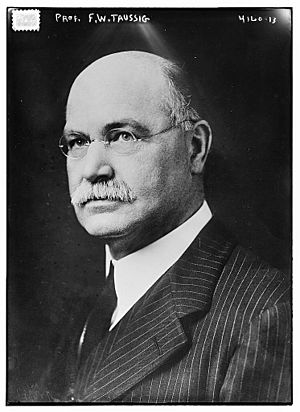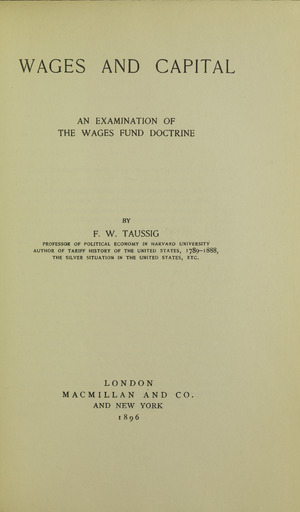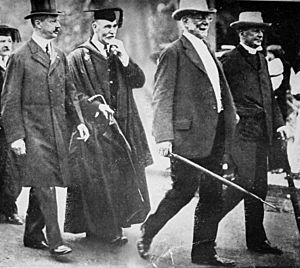F. W. Taussig facts for kids
Quick facts for kids
F. W. Taussig
|
|
|---|---|

Taussig, c. 1915
|
|
| Born |
Frank William Taussig
December 28, 1859 |
| Died | November 11, 1940 (aged 80) Cambridge, Massachusetts, US
|
| Alma mater | Harvard University |
| Spouse(s) |
|
| Scientific career | |
| Institutions | Harvard University |
| Doctoral students |
|
| Influences | Charles F. Dunbar |
Frank William Taussig (1859–1940) was an important American economist. He is known for helping to create the basic ideas of modern trade theory.
Contents
Early Life and Education
Frank William Taussig was born on December 28, 1859. His hometown was St. Louis, Missouri. His parents, William Taussig and Adele Wuerpel, encouraged his love for books and music. He even played the violin when he was young.
He went to public schools in St. Louis. Later, he studied at Washington University for a year. Then, he moved to Harvard, where he finished his studies in 1879.
After graduating, he traveled in Europe for a year. During this time, he studied economics at the University of Berlin. He then returned to Harvard to study law and economics. For some years, he also worked as a secretary for Harvard's President, Charles W. Eliot.
Teaching Career at Harvard
In 1886, Frank Taussig earned a law degree. He was then hired as an assistant professor at Harvard. By 1892, he became a full professor of economics.
He stayed at Harvard for most of his career. However, he did spend a few years working for the United States government. He also traveled in Europe to recover from a health issue.
Understanding Tariffs
In 1912, Taussig wrote an article about tariffs. A tariff is a tax on goods that come into a country. He believed that a tariff on imported sugar would help the American beet sugar industry.
He thought this industry offered many benefits. For example, it created jobs for workers. It also made American farming more diverse and capable. Beet sugar grows well in cool, irrigated areas like Colorado and California.
Important Roles and Contributions
Frank Taussig held several important positions. He was the editor of the Quarterly Journal of Economics for many years. He also served as the president of the American Economic Association from 1904 to 1905.
From 1917 to 1919, he was the head of the United States Tariff Commission. This group advises the government on trade taxes.
In 1919, he went to Paris to help with trade agreements. Later that year, President Woodrow Wilson asked him to attend a conference in Washington, DC. This meeting aimed to help workers and businesses get along better. Taussig was also a strong supporter of the League of Nations, an organization that worked for world peace.
Later Life and Family
Frank William Taussig passed away on November 11, 1940, at the age of 80. He died in Cambridge, Massachusetts. He is buried in Mount Auburn Cemetery in Cambridge.
After he retired, another famous economist, Joseph Schumpeter, took over his teaching position at Harvard.
In 1888, Taussig married Edith Thomas Guild. They had four children together. One of their children was Helen B. Taussig (1898–1986). She became a very famous doctor who specialized in treating children's hearts. Frank Taussig's first wife died in 1910. He later married Laura Fisher.
His Books
Frank Taussig wrote many books about economics. You can find many of his works online:
- 1883: Protection to Young Industries as Applied to the United States
- 1885: History of the Present Tariff, 1860–83
- 1888: The Tariff History of the United States
- 1892: The Silver Situation in the United States
- 1896: Wages and Capital
- 1911, 1915, 1927: Principles of Economics (two volumes)
- 1918: Some Aspects of the Tariff Question
- 1915: Inventors and Money Makers
- 1920: Free Trade, the Tariff, and Reciprocity
- 1927: International Trade
 | Madam C. J. Walker |
 | Janet Emerson Bashen |
 | Annie Turnbo Malone |
 | Maggie L. Walker |



